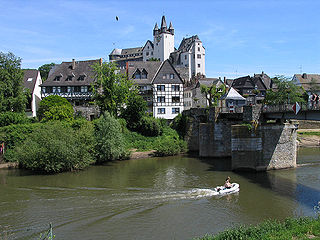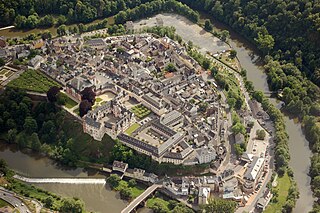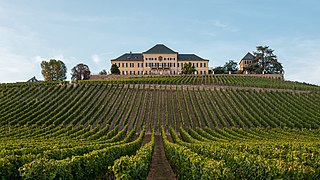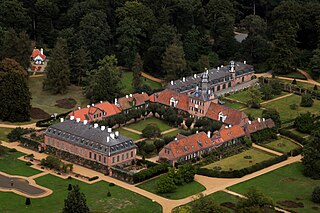
Wiesbaden is a city in central western Germany and the capital of the state of Hesse. As of June 2020, it had 290,955 inhabitants, plus approximately 21,000 United States citizens. The Wiesbaden urban area is home to approximately 560,000 people. Wiesbaden is the second-largest city in Hesse after Frankfurt am Main.

Giessen is one of the three Regierungsbezirke of Hesse, Germany, located in the middle of the state. It was created from counties (kreise) of Giessen, Lahn-Dill, Limburg-Weilburg and Vogelsbergkreis in Darmstadt and Marburg-Biedenkopf of Kassel on 1 January 1981.
The Hochtaunuskreis is a Kreis (district) in the middle of Hesse, Germany and is part of the Frankfurt/Rhine-Main Metropolitan Region. Neighbouring districts are Lahn-Dill, Wetteraukreis, district-free Frankfurt, Main-Taunus, Rheingau-Taunus, Limburg-Weilburg.
Limburg-Weilburg is a Kreis (district) in the west of Hesse, Germany. Neighboring districts are Lahn-Dill, Hochtaunuskreis, Rheingau-Taunus, Rhein-Lahn, Westerwaldkreis.

Idstein is a town of about 25,000 inhabitants in the Rheingau-Taunus-Kreis in the Regierungsbezirk of Darmstadt in Hesse, Germany. Because of its well preserved historical Altstadt it is part of the Deutsche Fachwerkstraße, connecting towns with fine fachwerk buildings and houses. In 2002, the town hosted the 42nd Hessentag state festival.

Mont-Tonnerre[mɔ̃.tɔ.nɛʁ] was a department of the First French Republic and later the First French Empire in present-day Germany. It was named after the highest point in the Palatinate, the Donnersberg. It was the southernmost of four departments formed in 1798 when the west bank of the Rhine was annexed by France. Prior to the French occupation, its territory was divided between the Archbishopric of Mainz, the Bishopric of Speyer, the Bishopric of Worms, Nassau-Weilburg, Hesse-Darmstadt, the Electorate of the Palatinate and the imperial cities of Worms and Speyer. Its territory is now part of the German states of Rhineland-Palatinate and Saarland. Its capital was Mainz.

Diez an der Lahn is a town in Germany's Rhein-Lahn district in Rhineland-Palatinate, on the borders of Hesse. Diez is the administrative seat of the municipality of Diez.

Hessischer Rundfunk is the German state of Hesse's public broadcasting corporation. Headquartered in Frankfurt, it is a member of the national consortium of German public broadcasting corporations, ARD.

Weilburg is, with just under 14,000 inhabitants, the third biggest city in Limburg-Weilburg district in Hesse, Germany, after Limburg an der Lahn and Bad Camberg.

Oestrich-Winkel is a town with roughly 12,000 inhabitants in the Rheingau-Taunus-Kreis in the Regierungsbezirk of Darmstadt in Hesse, Germany.

Braunfels is a town in the Lahn-Dill-Kreis in Hesse, Germany. It is located on the German Timber-Frame Road.

Schloss Johannisberg is a schloss and winery in the village of Johannisberg to the west of Wiesbaden, Hesse, in the Rheingau wine-growing region of Germany. It has been making wine for over 900 years. The winery is most noted for its claim to have "discovered" late harvest wine. The palace is a venue of the Rheingau Musik Festival, made available by co-founder Tatiana von Metternich-Winneburg.

Schloss Wolfsgarten is a former hunting seat of the ruling family of Hesse-Darmstadt, located in the German state of Hessen, approximately 15 kilometers south of Frankfurt am Main. The hunting lodge was established between 1722 and 1724 by Landgrave Ernst Ludwig of Hesse-Darmstadt. Ernst Ludwig's purpose in establishing Wolfsgarten was to pursue his passion for hunting with dogs which he introduced into Hesse in 1709. The original building corresponded to the usual pattern for hunting seats of that era with a rectangular yard around which was grouped housing for gentlemen, the stables for the horses, and kennels for the dogs. After Ernst Ludwig's successors abandoned hunting with dogs in 1768, Wolfsgarten was abandoned until the 1830s when the grand ducal family began to restore and expand the property. From 1879, Wolfsgarten became a favorite country retreat for Grand Dukes Ludwig IV and his son Ernst Ludwig.
A Schubertiade is an event held to celebrate the music of Franz Schubert (1797–1828). Modern Schubertiades also include concert series and festivals, such as the Schubertiade Vorarlberg.

The Rheingau Musik Festival (RMF) is an international summer music festival in Germany, founded in 1987. It is mostly for classical music, but includes other genres. Concerts take place at culturally important locations, such as Eberbach Abbey and Schloss Johannisberg, in the wine-growing Rheingau region between Wiesbaden and Lorch.
Philip III, Count of Nassau-Weilburg was a Count of the Nassau-Weilburg. Among his major achievements were the introduction of the Reformation, the foundation of the Gymnasium Philippinum in Weilburg and the start of the construction of Schloss Weilburg.

Wiesbaden City Palace is a neo-classical building in the center of Wiesbaden, Germany. It was completed in 1841 as the principal city residence of the Dukes of Nassau. The palace has several wings, 145 rooms, and is architecturally integrated with a group of ancillary buildings constructed both before and after it was built. With ornate towers, gables and a slate roof laid in herringbone patterns, the three-story complex lends charm and its name to the central square of Wiesbaden: Palace Square.

Martin Lutz is a German musicologist, conductor and harpsichordist. He was the musical director of the concert choir Schiersteiner Kantorei in Wiesbaden from 1972 to 2017, and founded the biennial festival Wiesbadener Bachwochen in 1975.

Bad Homburg Castle is a castle and palace in the German city of Bad Homburg vor der Höhe. Originally the residence of the Landgraves of Hesse-Homburg, it was first built in the 12th century. All but the keep was demolished in 1660 by Frederick II, Landgrave of Hesse-Homburg. He replaced the old castle with a new one designed by Paul Andrich between 1680 and 1685. Its grounds and gardens were landscaped in the 18th and 19th centuries, including the addition of the Gothic House.

Schloss Weilburg is a Baroque schloss in Weilburg, Hesse, Germany. It is located on a spur above the river Lahn and occupies about half of the area of the Old Town of Weilburg. It contains the Hochschloss, built between 1530 and 1572, which is one of the best-preserved Renaissance palaces in Hesse. In the 1700s, the palace was expanded by John Ernst, Count of Nassau-Weilburg, and his builder, Julius Ludwig Rothweil. The buildings and gardens now belong to the Verwaltung der Staatlichen Schlösser und Gärten Hessen, and they can be visited as a museum on guided tours. Parts of the palace are venues for the music festival Weilburger Schlosskonzerte, which is named after the palace.
















